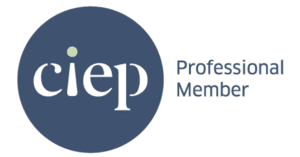Top self-improvement books inspire readers to make meaningful changes in various aspects of life. From enhancing careers to improving relationships and fostering mindfulness, these books provide practical strategies and insights for personal growth.
This post explores 50 highly-rated self-improvement books, ranked on Amazon and Goodreads, across 10 key categories, including habit formation, personal finance, creativity and mindfulness. These books have made a significant impact on readers, offering guidance and motivation. For aspiring writers, this list can serve as inspiration for writing their own self-improvement book. Additionally, the post includes an 8-step guide on how to write a self-improvement book, providing practical advice on turning your ideas into a compelling, helpful resource for readers.
- Career and business
- Creativity and innovation
- Emotional intelligence
- Habit formation and behaviour change
- Health and wellness
- Personal development
- Personal finance and wealth building
- Productivity and time management
- Relationships and communication
- Spirituality and mindfulness
Self-improvement books categories
Self-improvement books cover a wide range of topics aimed at helping individuals enhance various aspects of their lives. Common self-improvement literature categories include career and business, creativity and innovation, emotional intelligence and many more. Here is a breakdown of 10 most common self-improvement genres:
- Career and business self-improvement books focus on career advancement, entrepreneurship and leadership skills and offer strategies for professional success.
- Creativity and innovation books inspire creative thinking, problem-solving and fostering innovation in both personal and professional pursuits.
- Emotional intelligence books help develop self-awareness, empathy and resilience skills and focus on understanding and managing emotions.
- Habit formation and behaviour change self-improvement books provide practical strategies for breaking bad habits, forming new ones and implementing positive behavioural changes for personal growth.
- Health and wellness books cover physical, mental and emotional well-being and provide guidance on nutrition, fitness or stress management.
- Personal development books focus on personal growth, self-awareness, mindset and achieving one’s potential.
- Personal finance and wealth building self-help books cover topics like budgeting, investing and saving and help individuals manage their money more effectively and build wealth over time.
- Productivity and time management books offer strategies for managing time effectively, increasing productivity and achieving goals efficiently.
- Relationships and communication books explore building and maintaining healthy relationships, effective communication and conflict resolution skills.
- Spirituality and mindfulness books aim to nurture inner peace and fulfilment by exploring topics such as meditation and finding purpose or meaning.
Top self-improvement books in the career and business category
Deep Work: Rules for Focused Success in a Distracted World by Cal Newport
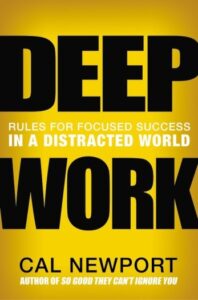
Cal Newport’s Deep Work presents a compelling argument for the necessity of focused, undistracted work in a world of constant interruptions. Newport believes that deep work is crucial for achieving high levels of productivity and professional success. The author defines deep work as characterised by intense concentration and cognitive engagement. Deep Work offers practical strategies for cultivating deep work habits, such as scheduling dedicated time for focused work, minimising distractions and embracing boredom as a catalyst for deep thinking.
The Hard Thing about Hard Things: Building a Business When There Are No Easy Answers by Ben Horowitz
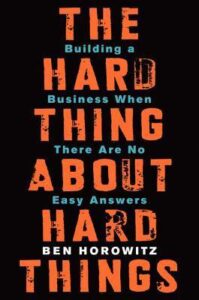
In The Hard Thing about Hard Things, Ben Horowitz offers candid and practical advice for navigating the challenges of building and leading a startup. This advice draws from the author’s experiences as a successful entrepreneur and venture capitalist. Next, Horowitz provides insights into the complexities of decision-making, managing teams and overcoming adversity in the volatile world of business. He then addresses tough topics such as firing friends, dealing with failure and maintaining morale during times of uncertainty. Finally, Horowitz emphasises the importance of resilience, perseverance and a willingness to tackle the toughest problems head-on. By sharing these lessons and anecdotes, The Hard Thing about Hard Things offers invaluable guidance for aspiring and seasoned entrepreneurs.
How to Win Friends and Influence People by Dale Carnegie
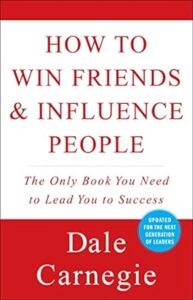
Dale Carnegie’s classic, How to Win Friends and Influence People, remains as relevant today as it was when first published in 1936. Carnegie’s timeless principles for interpersonal communication and relationship-building provide a roadmap for success in both professional and personal life. He emphasises the importance of empathy, active listening and genuine appreciation for others’ perspectives. Moreover, Carnegie offers practical techniques for improving communication skills, resolving conflicts and winning people over to your way of thinking. In sum, the book encourages the readers to focus on building positive relationships based on trust and mutual respect to enhance their influence and effectiveness in all areas of life.
The Lean Startup: How Today’s Entrepreneurs Use Continuous Innovation to Create Radically Successful Businesses by Eric Ries
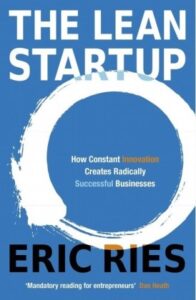
Eric Ries’s The Lean Startup presents a methodology for building and scaling startups through rapid experimentation and customer feedback. Ries advocates for a lean approach to entrepreneurship. This approach involves a relentless focus on delivering value to customers and minimising wasted resources. He introduces concepts such as the minimum viable product, validated learning and the build-measure-learn feedback loop. These ideas enable startups to iterate quickly and adapt to changing market conditions. By prioritising learning over planning and embracing uncertainty as a natural part of the startup journey, entrepreneurs can increase their odds of success and create innovative, sustainable businesses that meet the needs of their customers.
Outliers: The Story of Success by Malcolm Gladwell
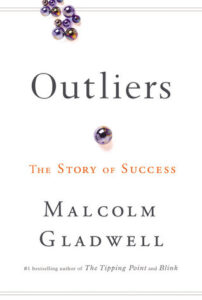
Malcolm Gladwell’s Outliers challenges conventional notions of success by exploring the factors that contribute to extraordinary achievement. Gladwell examines the roles of talent, opportunity, cultural background and environmental factors in shaping the trajectories of successful individuals and groups. He argues that while talent and hard work are important, they are not the sole determinants of success. Instead, timing, luck and cultural heritage play significant roles in propelling individuals to greatness. Through engaging anecdotes and thought-provoking analysis, Gladwell invites readers to reconsider their assumptions about success and recognise the complex interplay of factors that influence human achievement.
Top self-improvement books in the creativity and innovation category
The Creative Habit: Learn It and Use It for Life by Twyla Tharp
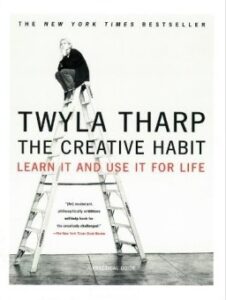
In The Creative Habit, Twyla Tharp shares insights and strategies for cultivating creativity and maintaining a disciplined creative practice. Tharp emphasises the importance of establishing rituals and routines to harness creative energy. She encourages readers to develop habits that foster inspiration and productivity. They include embracing failure as a learning opportunity and seeking inspiration from diverse sources. In sum, Tharp offers readers a roadmap for unlocking their creative potential and integrating creativity into their daily lives.
Creativity, Inc.: Overcoming the Unseen Forces That Stand in the Way of True Inspiration by Ed Catmull and Amy Wallace
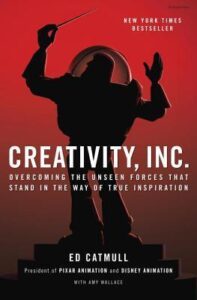
Creativity, Inc. by Ed Catmull, co-founder of Pixar, offers a behind-the-scenes look at the creative processes and management principles that have made Pixar one of the most successful entertainment companies. First, Catmull explores the challenges of fostering creativity within a corporate environment. Moreover, he shares strategies for overcoming common obstacles such as fear of failure, hierarchical structures and communication breakdowns. He emphasises the importance of creating a culture that values openness, collaboration and continuous improvement. In such an environment, employees feel empowered to take risks and express their creativity freely. Overall, Catmull demonstrates how cultivating a culture of creativity and innovation can lead to groundbreaking achievements and sustained success.
Creative Visualization: Use the Power of Your Imagination to Create What You Want in Your Life by Shakti Gawain
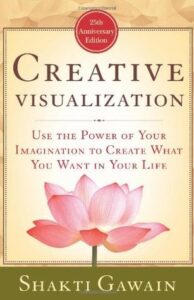
Creative Visualization by Shakti Gawain explores the transformative potential of harnessing the power of imagination to manifest desired outcomes in one’s life. Gawain introduces readers to the concept of creative visualisation. Visualisation is a technique for mentally picturing goals and desires as if they have already been achieved. She outlines a step-by-step process for practising creative visualisation, including relaxation exercises, positive affirmations and guided imagery. Furthermore, Gawain emphasises the importance of clarity, belief and emotional resonance in manifesting desired outcomes. In addition, she offers practical tips for overcoming limiting beliefs and aligning one’s thoughts and actions with their goals. In sum, Gawain empowers readers to tap into their innate creative abilities and create positive change in their lives through the power of visualisation.
Show Your Work!: 10 Ways to Share Your Creativity and Get Discovered by Austin Kleon
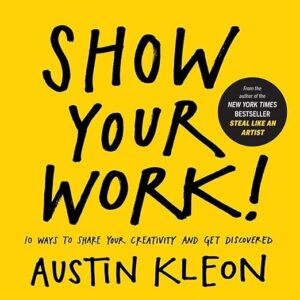
In Show Your Work!, Austin Kleon offers practical advice for artists, writers and creatives looking to share their work and build an audience in the digital age. Kleon advocates for transparency, generosity and authenticity in creative practice. Moreover, he encourages creators to document their process, share their influences and engage with their audience openly. He provides 10 actionable strategies for showcasing creative work effectively, including sharing something small every day, embracing the process of ‘amateurism’ and cultivating a network of like-minded individuals. In short, Kleon demonstrates how sharing one’s creative journey can lead to opportunities, connections and personal growth.
Where Good Ideas Come From: The Natural History of Innovation by Steven Johnson
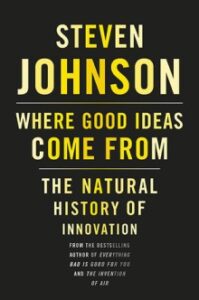
Steven Johnson’s Where Good Ideas Come From explores the origins and evolution of innovation, drawing on insights from biology, sociology and technology to uncover the patterns of creative breakthroughs. Johnson identifies key principles that contribute to the emergence of new ideas, such as the role of networks, luck and the exchange of diverse perspectives. He argues that innovation is not the result of solitary genius but rather the product of collective intelligence and the remixing of existing ideas. Overall, Johnson illustrates how environments that foster collaboration, experimentation and the exchange of ideas can fuel innovation and drive progress in various fields.
Top self-improvement books in the emotional intelligence category
Emotional Intelligence: Why It Can Matter More Than IQ by Daniel Goleman
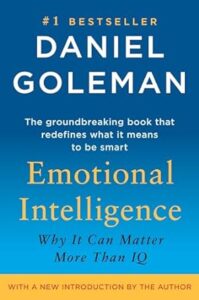
Daniel Goleman’s Emotional Intelligence argues that emotional intelligence comprises self-awareness, self-regulation, social awareness and relationship management. Moreover, emotional intelligence better predicts success than traditional measures like IQ. To support this argument, Goleman presents research demonstrating the impact of emotional intelligence on various aspects of life, from personal relationships to professional achievement. Key takeaways include the importance of recognising and managing emotions effectively, developing empathy and social skills and fostering emotional intelligence in both individuals and organisations.
Daring Greatly: How the Courage to Be Vulnerable Transforms the Way We Live, Love, Parent, and Lead by Brené Brown
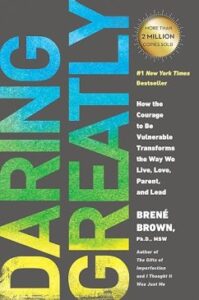
In Daring Greatly, Brené Brown explores how embracing vulnerability can lead to transformative changes in various aspects of life. Brown argues that vulnerability is essential for building authentic connections and resilience in the face of shame and uncertainty. In sum, Brown emphasises the importance of courageously showing up, owning our stories and embracing imperfection as a pathway to wholehearted living.
The Language of Emotions: What Your Feelings Are Trying to Tell You by Karla McLaren
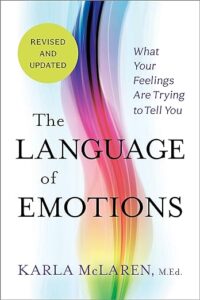
Karla McLaren’s The Language of Emotions offers insights into the wisdom and purpose behind our emotional experiences. McLaren presents a framework for understanding and working with emotions as valuable messengers that provide guidance and information about our needs and desires. Some of the most important takeaways from The Language of Emotions include honouring and expressing emotions authentically, cultivating emotional awareness and resilience and developing healthier relationships with ourselves and others.
Permission to Feel: Unlocking the Power of Emotions to Help Our Kids, Ourselves, and Our Society Thrive by Marc Brackett
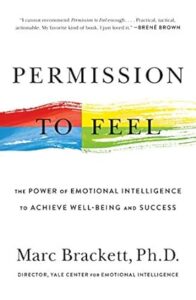
Permission to Feel by Marc Brackett provides a comprehensive guide to understanding and harnessing the power of emotions for personal and societal well-being. Brackett emphasises the importance of teaching individuals to recognise, understand and regulate their emotions effectively. He introduces the RULER approach — a framework for emotional intelligence comprising 5 key skills. They include:
- recognising emotions
- understanding the causes and consequences of emotions
- labelling emotions accurately
- expressing emotions appropriately
- regulating emotions effectively.
Brackett also demonstrates how cultivating emotional intelligence can lead to improved relationships, mental health and academic and professional success. In particular, he highlights the significance of emotional literacy in promoting empathy, resilience and social connection and the importance of creating supportive environments that validate and honour individuals’ emotional experiences.
The Power of Vulnerability: Teachings on Authenticity, Connection, and Courage by Brené Brown
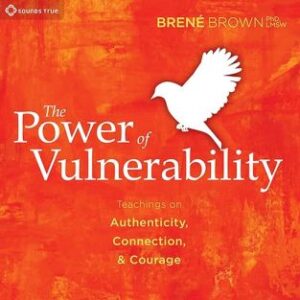
In The Power of Vulnerability, Brené Brown explores the transformative potential of embracing vulnerability as a pathway to authentic connection and courage. Brown challenges the misconception that vulnerability is a weakness. Instead, she argues it is the birthplace of innovation, creativity and meaningful relationships. Furthermore, Brown explores the links between vulnerability, shame and resilience and offers practical strategies for cultivating courage.
Top self-improvement books in the habit formation and behaviour change category
The 7 Habits of Highly Effective People by Stephen R. Covey
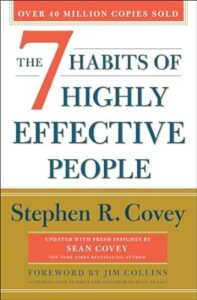
Stephen R. Covey’s The 7 Habits of Highly Effective People presents a holistic approach to self-improvement based on 7 core habits that empower individuals to achieve their goals and live a fulfilling life. These habits include:
- being proactive
- beginning with the end in mind
- putting first things first
- thinking win-win
- seeking first to understand, then to be understood
- synergising
- sharpening the saw.
Covey emphasises personal responsibility, integrity and continuous growth as the foundation for success. Key takeaways from The 7 Habits of Highly Effective People include aligning actions with values, prioritising importance over urgency and fostering meaningful relationships built on trust and mutual respect.
Atomic Habits: An Easy & Proven Way to Build Good Habits & Break Bad Ones by James Clear
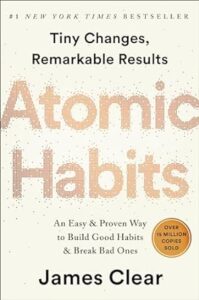
In Atomic Habits, James Clear presents a practical framework for building and breaking habits that can lead to remarkable results. Clear introduces the concept of atomic habits. Atomic habits are small, incremental changes that compound over time to produce significant outcomes. Moreover, he explores the science behind habit formation and offers strategies for designing environments, mastering cues and implementing rewards to make habit adoption easier and more sustainable.
Mindset: The New Psychology of Success by Carol S. Dweck
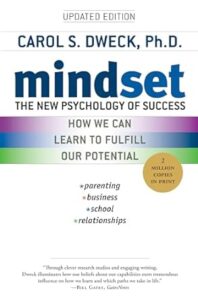
Carol S. Dweck’s Mindset explores the power of mindset in shaping success and achievement. Dweck introduces the concept of fixed and growth mindsets. She argues that individuals with a growth mindset believe that abilities can be developed through effort and perseverance. In turn, this will lead to a willingness to embrace challenges and learn from failure. In contrast, those with a fixed mindset believe that abilities are innate and unchangeable, leading to a fear of failure and a tendency to avoid challenges. In sum, Dweck encourages cultivating a growth mindset, reframing setbacks as opportunities for growth and fostering a culture of continuous learning and improvement.
The Power of Habit: Why We Do What We Do in Life and Business by Charles Duhigg
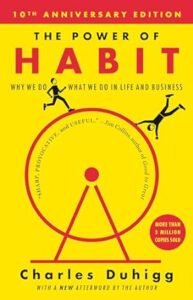
This New York Times bestseller explores the science of habit formation and its profound impact on individual and organisational behaviour. Duhigg presents a framework for understanding how habits are formed, how they can be changed and how they shape our lives. He introduces the habit loop: a cue, routine and reward. Next, he explains how habits operate in various aspects of life, from personal routines to organisational cultures. Finally, drawing from neuroscience, psychology and business, Duhigg offers practical strategies for identifying and reshaping habits to achieve desired outcomes. Key takeaways from The Power of Habit include the importance of recognising habit cues, experimenting with habit routines and designing rewards that reinforce positive behaviours.
Tiny Habits: The Small Changes That Change Everything by BJ Fogg
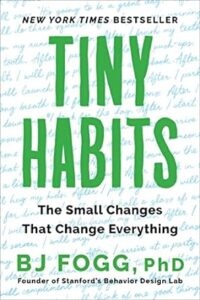
In Tiny Habits, BJ Fogg argues that by making small, sustainable changes to our behaviour, we can create lasting habits that can significantly improve our lives. Moreover, he introduces the concept of titular tiny habits. They are small, easy-to-do actions anchored to existing routines and followed by immediate celebration. Fogg’s method focuses on creating habits that are easy to start and reinforce, leading to gradual but transformative change. Overall, Fogg’s approach offers a practical and effective way for individuals to build habits that stick and achieve their goals with minimal effort and maximum impact.
Top self-improvement books in the health and wellness category
The Anxious Generation: How the Great Rewiring of Childhood Is Causing an Epidemic of Mental Illness by Jonathan Haidt

In The Anxious Generation, Jonathan Haidt examines the societal factors contributing to the rise in mental health issues among today’s youth. Haidt explores how changes in parenting styles, education and technology have reshaped the childhood experience, leading to increased rates of anxiety, depression and other mental illnesses. He argues that overprotection, social media use and academic pressure have created a generation ill-equipped to cope with adversity and uncertainty. In response, Haidt also offers insights into how parents, educators and policymakers can address these challenges and support the mental well-being of young people.
The Circadian Code: Lose Weight, Supercharge Your Energy, and Sleep Well Every Night by Satchin Panda

Satchin Panda’s The Circadian Code delves into the importance of aligning our daily routines with our body’s natural circadian rhythms for optimal health and well-being. Panda explores how disruptions to our circadian rhythm, such as irregular sleep patterns and eating schedules, can lead to various health issues, including obesity and diabetes. He offers practical strategies for syncing our lifestyle habits with our internal body clocks. For instance, these techniques include establishing consistent sleep-wake cycles, timing meals appropriately and optimising exposure to natural light. Panda’s other insights highlight maintaining a regular daily schedule, prioritising sleep hygiene and embracing time-restricted eating for improved health and energy levels.
Genius Foods: Become Smarter, Happier, and More Productive While Protecting Your Brain for Life by Max Lugavere and Paul Grewal
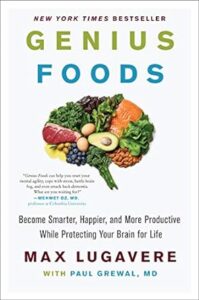
In Genius Foods, Max Lugavere and Paul Grewal explore the link between nutrition and cognitive function. They offer insights into how dietary choices can influence brain health and performance. The authors highlight the importance of consuming nutrient-rich foods that support cognitive function and protect against age-related decline and neurodegenerative diseases. They advocate for a diet rich in brain-boosting nutrients such as omega-3 fatty acids, antioxidants and polyphenols while minimising consumption of processed foods and sugars that can impair brain function. In short, this New York Times bestseller explores the benefits of incorporating brain-friendly foods into daily meals, prioritising nutrient-dense whole foods and adopting lifestyle habits that support cognitive vitality and longevity.
How Not to Die: Discover the Foods Scientifically Proven to Prevent and Reverse Disease by Michael Greger and Gene Stone
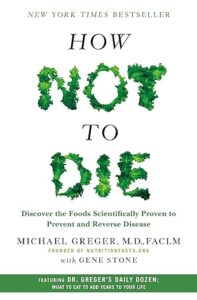
In How Not to Die, Michael Greger and Gene Stone explore the link between diet and chronic diseases, offering evidence-based recommendations for preventing and reversing common health conditions. The authors examine the latest scientific research on nutrition and disease prevention. For instance, they highlight the power of plant-based foods in promoting longevity and reducing the risk of heart disease, cancer and other chronic illnesses. Furthermore, they advocate for a diet rich in fruits, vegetables, legumes and whole grains while limiting consumption of animal products and processed foods. In short, How Not to Die explains how to eat a diverse range of plant foods, incorporate more greens, beans and berries into meals and adopt a lifestyle prioritising health and wellness.
Why We Sleep: Unlocking the Power of Sleep and Dreams by Matthew Walker
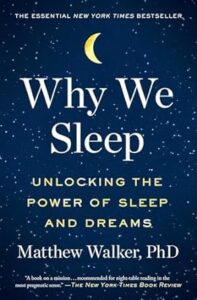
Matthew Walker’s Why We Sleep explores the science of sleep and its profound impact on every aspect of our lives. Walker presents compelling research demonstrating the critical role of sleep in memory consolidation, learning, mood regulation and physical health. He highlights the dangers of sleep deprivation and offers practical strategies for improving sleep quality and duration. Moreover, Walker discusses creating a sleep-friendly environment and prioritising sleep as a non-negotiable component of a healthy lifestyle. In summary, Walker’s insights underscore the significance of sleep in optimising performance, longevity and overall quality of life.
Top self-improvement books in the personal development category
The Compound Effect: Jumpstart Your Income, Your Life, Your Success by Darren Hardy
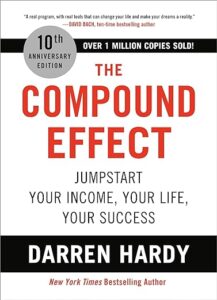
In The Compound Effect, Darren Hardy explores the power of small, consistent actions. The author believes they create significant and lasting change in various areas of life. Moreover, Hardy introduces the concept of the compound effect. This term describes tiny decisions and behaviours that compound over time and lead to exponential growth and achievement. Next, the book emphasises the importance of taking personal responsibility for one’s choices and habits. Moreover, the author highlights the need to cultivate discipline and consistency to achieve long-term success. The Compound Effect will leave you thinking about tracking progress and making incremental daily improvements to harness the compound effect.
Grit: The Power of Passion and Perseverance by Angela Duckworth
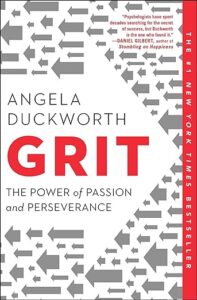
In Grit, Angela Duckworth explores the psychology of success and the role of passion and perseverance in achieving long-term goals. Duckworth introduces the concept of grit — a combination of passion and perseverance. She argues it is a more reliable predictor of success than talent or intelligence alone. Drawing from psychology and neuroscience, she offers insights into how individuals can cultivate grit through deliberate practice. Key takeaways of Grit include setting meaningful goals, embracing challenges as opportunities for growth and maintaining a sense of purpose and commitment to excellence.
Man’s Search for Meaning by Viktor E. Frankl
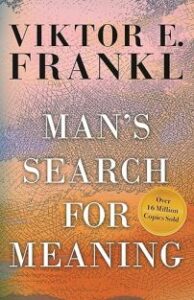
Man’s Search for Meaning by Viktor E. Frankl is a profound exploration of the human experience and the quest for meaning in the face of suffering. Frankl was a Holocaust survivor and psychiatrist. His book reflects on his experiences in Nazi concentration camps and explores how individuals can find purpose and resilience even in the most challenging circumstances. In this vein, the author introduces logotherapy, a psychotherapeutic approach focused on helping individuals discover meaning in their lives, regardless of their circumstances.
The Power of Now: A Guide to Spiritual Enlightenment by Eckhart Tolle
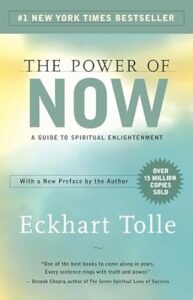
Eckhart Tolle’s The Power of Now is a spiritual guide that emphasises the importance of living in the present moment to achieve inner peace and enlightenment. Tolle explores how the human mind tends to dwell on past regrets or future anxieties, which leads to suffering and discontent. He offers practical techniques for cultivating mindfulness and awareness. They allow individuals to break free from the cycle of negative thinking and find serenity in the present. In sum, Tolle teaches surrendering to the flow of life and accessing the transformative power of presence to experience a true spiritual awakening.
The Four Agreements: A Practical Guide to Personal Freedom by Don Miguel Ruiz
| Amazon: | Goodreads: 4.19 |

The Four Agreements by Don Miguel Ruiz discusses personal freedom and transformation based on ancient Toltec wisdom. Ruiz presents 4 principles for living a fulfilling life:
- be impeccable with your word
- do not take anything personally
- do not make assumptions
- always do your best.
He explores how these agreements can help individuals break free from self-limiting beliefs and patterns of suffering and allow them to experience greater happiness and inner peace. As a result, by practising authenticity, emotional resilience and clear communication, readers can cultivate healthier relationships and live with integrity. Ruiz’s teachings empower individuals to take responsibility for their own happiness and create a life aligned with their true values and aspirations. Through simple yet profound insights, The Four Agreements offers readers a practical framework for personal growth.
Top self-improvement books in the personal finance and wealth building category
The Bogleheads’ Guide to Investing by Mel Lindauer, Taylor Larimore and Michael LeBoeuf
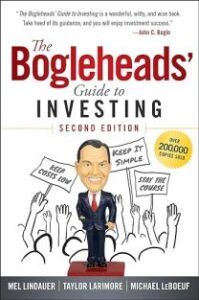
The Bogleheads’ Guide to Investing by Mel Lindauer, Taylor Larimore and Michael LeBoeuf is a comprehensive resource for individual investors seeking to build wealth through. Drawing on the principles of Vanguard founder John Bogle, the book advocates for a simple yet effective approach to investing. It focuses on minimising costs, diversifying and staying the course for the long term. Key takeaways include staying disciplined during market fluctuations, avoiding market timing and stock picking and focusing on factors within one’s control, such as asset allocation and expense ratios. Moreover, the authors provide practical advice on asset allocation, tax-efficient investing and creating a personalised investment plan tailored to individual goals and risk tolerance.
Financial Freedom: A Proven Path to All the Money You Will Ever Need by Grant Sabatier
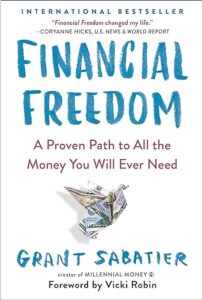
| Amazon: 4.6 | Goodreads: |
Financial Freedom by Grant Sabatier is a comprehensive guide to attaining financial independence. Sabatier draws from his journey of going from broke to early retirement in his thirties to provide readers with practical steps towards financial freedom. He emphasises the importance of setting clear financial goals, diversifying income streams and investing to build wealth over time. Sabatier’s approach is rooted in action and accountability, encouraging readers to take ownership of their financial futures and making informed decisions. In sum, Financial Freedom teaches cultivating a savings habit, leveraging the power of compound interest and embracing a mindset of abundance to unlock opportunities for financial growth.
The Psychology of Money: Timeless Lessons on Wealth, Greed, and Happiness by Morgan Housel
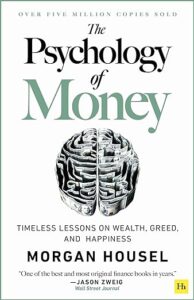
The Psychology of Money by Morgan Housel explains the behavioural and psychological aspects of money management. In other words, Housel explores how human emotions and biases influence financial decision-making. Furthermore, the author offers timeless lessons on wealth accumulation and financial well-being. For instance, he highlights the importance of patience, discipline and emotional resilience in navigating financial markets and achieving long-term prosperity. Housel’s insights are grounded in real-world examples and anecdotes, making complex financial concepts accessible to readers of all backgrounds.
Think and Grow Rich by Napoleon Hill
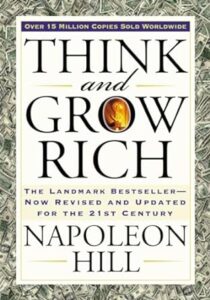
Think and Grow Rich by Napoleon Hill is a timeless classic exploring the principles of success and wealth accumulation. Hill distils lessons from interviews with successful individuals and presents a philosophy of personal achievement based on mindset, goal-setting and perseverance. He emphasises the power of positive thinking, goal visualisation and persistence in overcoming obstacles to achieve financial success. Hill’s insights are as relevant today as when the book was first published in 1937. It offers timeless wisdom and practical advice for achieving their financial goals. Key takeaways include the importance of cultivating a burning desire for success, developing a clear plan of action and maintaining unwavering faith in one’s ability to achieve greatness.
The Total Money Makeover: A Proven Plan for Financial Fitness by Dave Ramsey
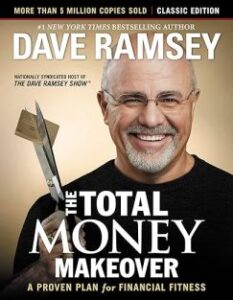
The Total Money Makeover by Dave Ramsey presents a step-by-step guide to achieving financial stability and freedom. Ramsey advocates for a disciplined approach to money management, including budgeting, debt reduction and building an emergency fund. He emphasises the importance of living below one’s means, avoiding debt and prioritising financial security over short-term gratification. Ramsey’s straightforward advice and actionable strategies provide readers with a clear path towards financial wellness.
Top self-improvement books in the productivity and time management category
The Checklist Manifesto: How to Get Things Right by Atul Gawande
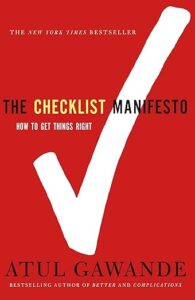
The Checklist Manifesto by Atul Gawande explores the transformative impact of checklists in improving performance and reducing errors across various industries. Gawande presents compelling anecdotes and research findings to demonstrate how simple checklists can enhance productivity, efficiency and safety in complex environments. By breaking down complex tasks into actionable steps and fostering communication and teamwork, checklists provide a powerful tool for streamlining processes and minimising mistakes.
Do More Better: A Practical Guide to Productivity by Tim Challies
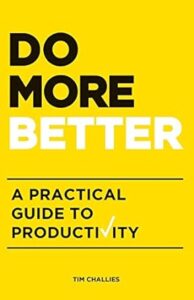
Do More Better by Tim Challies offers readers a comprehensive framework for maximising productivity and effectiveness in all areas of life. Challies introduces the concept of personal productivity systems, which encompass goal setting, task management and resource allocation to achieve optimal results. Furthermore, Challies guides readers in identifying priorities, organising tasks and leveraging technology to streamline workflows. Key takeaways of Do More Better include the significance of setting clear goals, establishing daily routines and using technology strategically to minimise distractions and increase efficiency.
Getting Things Done: The Art of Stress-Free Productivity by David Allen
Getting Things Done by David Allen presents a comprehensive system for organising tasks, managing projects and achieving stress-free productivity. At the core of Allen’s methodology is capturing all commitments, ideas and tasks into a trusted system. This principle helps free the mind to focus on execution rather than remembering details. The getting things done (GTD) system comprises 5 key steps:
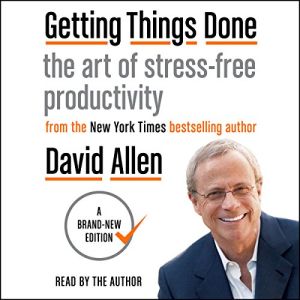
- capture
- clarify
- organise
- reflect
- engage.
Moreover, Allen introduced practical techniques such as the ‘2-minute rule,’ the ‘next action’ principle and the use of context-based lists. They aim to help readers streamline their workflow and overcome procrastination. Central to Allen’s approach is the concept of achieving a state of ‘mind like water,’ where one is calm, focused and able to respond effectively to changing demands.
The ONE Thing: The Surprisingly Simple Truth behind Extraordinary Results by Gary Keller and Jay Papasan
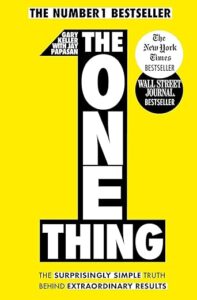
The ONE Thing by Gary Keller and Jay Papasan challenges the conventional wisdom of multitasking. Instead, it emphasises the power of focus in achieving exceptional outcomes. Keller and Papasan argue that individuals can unlock remarkable results by identifying the one thing that matters most and devoting uninterrupted time and energy to it. Drawing on insights from psychology and anecdotes from successful individuals, the authors provide a compelling framework for prioritisation and goal achievement. In sum, the book teaches setting clear goals, eliminating distractions and mastering time management to maximise productivity and success.
Sprint: How to Solve Big Problems and Test New Ideas in Just Five Days by Jake Knapp, John Zeratsky and Braden Kowitz
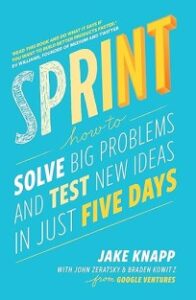
Sprint by Jake Knapp, John Zeratsky and Braden Kowitz introduces readers to the design sprint process. It is a structured framework for solving complex problems and testing innovative ideas in a short period. The authors outline a step-by-step approach to conducting a sprint, which inludes:
- defining goals
- generating ideas
- building prototypes
- testing solutions with real users.
Through real-world examples and practical exercises, the authors demonstrate how sprints can accelerate innovation and drive breakthrough results. By adopting the sprint methodology, teams can overcome inertia, validate assumptions and achieve tangible results in just 5 days.
Top self-improvement books in the relationships and communication category
The Five Love Languages: How to Express Heartfelt Commitment to Your Mate by Gary Chapman
The Five Love Languages by Gary Chapman explores the concept of love languages and how understanding them can strengthen relationships. Chapman identifies 5 primary love languages:

- words of affirmation
- acts of service
- receiving gifts
- quality time
- physical touch.
It explains how individuals can identify their own and their partner’s love language to express love more effectively. According to Chapman, by speaking their partner’s love language, individuals can demonstrate care and affection and foster intimacy and connection.
I Hear You: The Surprisingly Simple Skill behind Extraordinary Relationships by Michael S. Sorensen
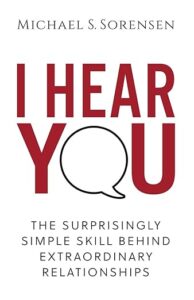
I Hear You by Michael S. Sorensen explains the transformative power of validation in building strong and meaningful connections with others. Sorensen introduces the concept of validation as the practice of acknowledging and accepting others’ thoughts, feelings and experiences without judgement. Through empathetic listening and genuine understanding, individuals can validate others’ emotions and create a safe and supportive space for open communication and connection. By validating others’ experiences, individuals can foster trust, empathy and intimacy in their relationships, leading to deeper connections and greater emotional well-being.
Nonviolent Communication: A Language of Life by Marshall B. Rosenberg
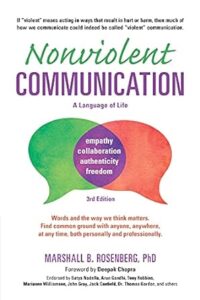
Nonviolent Communication by Marshall B. Rosenberg introduces readers to the principles and practices of compassionate communication. Based on his experience as a psychologist and mediator, Rosenberg presents a framework for expressing needs, listening empathetically and resolving conflicts peacefully. At the heart of non-violent communication is the idea of identifying and expressing universal human needs, such as safety, belonging and autonomy without judgment or blame. By focusing on observations, feelings, needs and requests, individuals can create connections based on empathy and understanding rather than defensiveness or aggression.
Rewriting the Rules: An Anti Self-Help Guide to Love, Sex and Relationships by Meg-John Barker
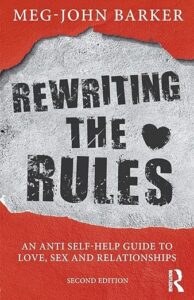
Rewriting the Rules by Meg-John Barker challenges conventional relationship norms and offers an alternative perspective on love, sex and intimacy. Barker encourages readers to question societal expectations and norms surrounding relationships and explore what works best for them. Drawing on research and personal anecdotes, Barker explores topics such as consent, communication and diversity in relationships. In sum, the author offers practical advice and thought-provoking insights for readers seeking to navigate the complexities of love and intimacy in the modern world.
Thriving through Transition: Self-Care for Parents of Transgender Children by Denise O’Doherty
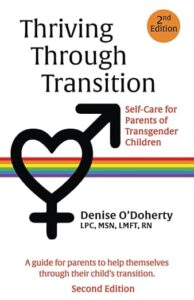
Thriving Through Transition provides practical support and guidance for parents navigating the journey of parenting transgender children. The book offers strategies for self-care, coping with stress and supporting the well-being of both parents and children during the transition. The authors address common challenges and concerns faced by parents. In response, they offer validation, reassurance and practical tools for navigating this unique parenting journey. In sum, read Thriving through Transition to learn about self-compassion, seeking support and advocating for the needs and rights of transgender children and their families.
Top self-improvement books in the spirituality and mindfulness category
The Book of Joy: Lasting Happiness in a Changing World by Dalai Lama XIV, Desmond Tutu and Douglas Carlton Abrams
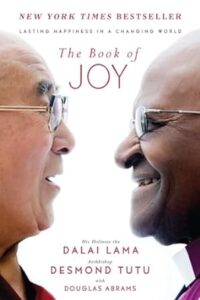
The Book of Joy by Dalai Lama XIV, Desmond Tutu and Douglas Carlton Abrams is a profound exploration of joy and resilience in the face of adversity. For instance, the Dalai Lama and Archbishop Tutu share their insights on finding lasting happiness amidst life’s challenges. They offer readers practical wisdom and spiritual practices for cultivating joy, compassion and gratitude. Moreover, the authors encourage readers to shift their perspective from self-centring to focusing on others because they recognise that true joy arises from connection and service to others. By embracing the principles of compassion, forgiveness and gratitude, readers can appreciate a deeper sense of joy, meaning and fulfilment in their lives.
The Miracle of Mindfulness: An Introduction to the Practice of Meditation by Thich Nhat Hanh
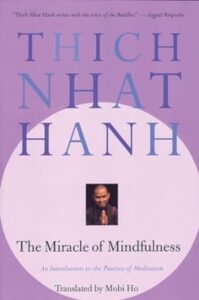
The Miracle of Mindfulness by Zen master Thich Nhat Hanh explores mindfulness as a transformative practice in everyday life. Hanh introduces readers to mindfulness to cultivate presence, peace and compassion. Next, the author provides practical tools for integrating mindfulness into daily activities. Moreover, Hanh emphasises the importance of living in the present moment, from breathing and walking to eating and communicating. In sum, The Miracle of Mindfulness teaches readers to find joy and fulfilment in simple moments of being. This is because true happiness arises from the ability to fully engage with the present moment without judgment or distraction. Through mindfulness, Hanh invites readers to awaken to the richness of life’s experiences and cultivate a deeper connection with oneself and the world.
Radical Acceptance: Embracing Your Life with the Heart of a Buddha by Tara Brach
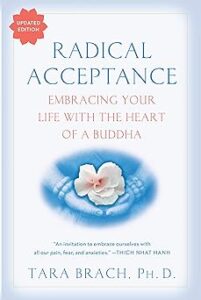
Radical Acceptance by Tara Brach discusses acceptance to find peace and freedom despite life’s challenges. Brach guides readers to embrace their experiences with kindness, compassion and non-judgement. Moreover, the author shows how to recognise that true healing and transformation arise from accepting reality as it is. Brach uses personal anecdotes, mindfulness practices and guided meditations to offer readers practical tools for cultivating self-compassion and embracing life with an open heart. Next, she encourages readers to cultivate a sense of spacious awareness and compassion towards themselves and others. At the same time, readers should recognise that true healing and transformation arise from embracing the full spectrum of human experience. In sum, this book is for readers interested in cultivating a deeper sense of connection, authenticity and resilience.
Wherever You Go, There You Are: Mindfulness Meditation in Everyday Life by Jon Kabat-Zinn
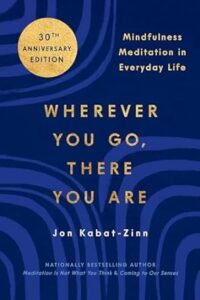
Wherever You Go, There You Are by Jon Kabat-Zinn is a practical guide to integrating mindfulness into daily life. Kabat-Zinn introduces readers to the transformative potential of mindfulness in fostering awareness, acceptance and compassion. The author then offers a roadmap for cultivating mindfulness in every moment. Furthermore, Kabat-Zinn emphasises the importance of non-judgemental awareness and present-moment attention in navigating life’s challenges with resilience and clarity. Key takeaways include bringing mindfulness to daily activities such as walking, eating and communicating, as well as practising meditation to deepen self-awareness and inner peace. In short, Kabat-Zinn encourages readers to cultivate a sense of curiosity and openness towards their experiences, recognising that true happiness arises from fully engaging with the present moment.
The Wisdom of Insecurity: A Message for an Age of Anxiety by Alan W. Watts
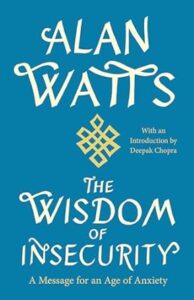
The Wisdom of Insecurity by Alan W. Watts explores the human tendency to seek security and control in an inherently uncertain world. Watts challenges readers to embrace the paradox of insecurity as an essential aspect of existence, urging them to let go of the illusion of control and certainty. Thus, he invites readers to confront their fears and anxieties and find freedom in accepting the impermanent nature of life. Moreover, Watts encourages readers to cultivate a sense of trust in the unfolding of life, embracing uncertainty as a source of creativity and growth. By releasing the grip of insecurity and surrendering to the flow of existence, readers can discover a deeper sense of peace, authenticity and liberation.
How to write a helpful self-improvement book?
Writing a self-improvement book involves careful planning, research and a clear understanding of your target audience. Here are 8 steps for writing a self-improvement book:
#1 Identify your niche and audience
Determine the specific aspect of self-improvement you want to focus on (e.g. productivity, mindset, health) and define your target audience. Consider what unique angle or experience you bring to the topic.
#2 Research and validate your ideas
Thoroughly research your topic to ensure your ideas are grounded in evidence. Look for relevant studies, expert opinions and successful examples. This helps validate your approach and ensures you offer value to readers.
#3 Develop a clear structure
Organise your content into a logical flow. Most self-improvement books follow a structure that includes an introduction, core chapters and a conclusion:
- Introduction outlines the problem and why it matters and gives an overview of what the book will cover.
- Core chapters: Each chapter should focus on a key idea, offering actionable advice, personal stories or case studies to illustrate your points.
- Conclusion recaps the main lessons and encourages readers to take action.
#4 Use a relatable tone
Write in a way that connects with your readers. Depending on your audience, consider using a conversational, motivational tone while avoiding jargon. Include real-life examples, anecdotes or personal experiences to make your content relatable.
#5 Provide practical, actionable advice
Offer concrete strategies, exercises or tips that readers can immediately apply to their lives. The more practical and easy-to-implement your advice, the more likely readers will find your book valuable.
#6 Edit and revise
Self-improvement books need to be clear and concise. Edit thoroughly to ensure your ideas are easy to understand and smooth the flow between sections. Consider getting feedback from beta readers or hiring an editor to refine your manuscript. For instance, professional developmental or line editing evaluates the overall structure and content of the book and ensures it is coherent, logical and well-organised. These processes help identify gaps, areas needing further development and redundancies that can be eliminated.
Once the content is solid, copyediting focuses on refining technical aspects like grammar, punctuation, spelling and syntax. As a result, it ensures the book is clear, error-free and concise. Proofreading is the final step, catching any last-minute errors or typos that may have been missed.
Additionally, including an index can help readers navigate your book more efficiently, allowing them to quickly locate specific information.
#7 Create a compelling title and cover
Choose a title that captures the essence of your book and resonates with your target audience. The cover design should be professional, as it is a key factor in grabbing attention.
#8 Plan for publishing and marketing
Decide whether you will self-publish or seek traditional publishing. Either way, having a marketing plan is crucial. Build an online presence, use social media to engage with your audience and consider strategies like email newsletters, blog posts, reader magnet or public speaking.
Key takeaways
Top self-improvement books cover a wide range of topics aimed at helping individuals enhance various aspects of their lives, from career and business to relationships and spirituality. Common categories of self-improvement books include career and business, creativity and innovation, emotional intelligence, habit formation and behaviour change, health and wellness, personal development, personal finance and wealth building, productivity and time management, relationships and communication and spirituality and mindfulness.
Contact me if you are an author looking for editing or indexing services. I am an experienced editor offering a free sample edit and an early bird discount.

